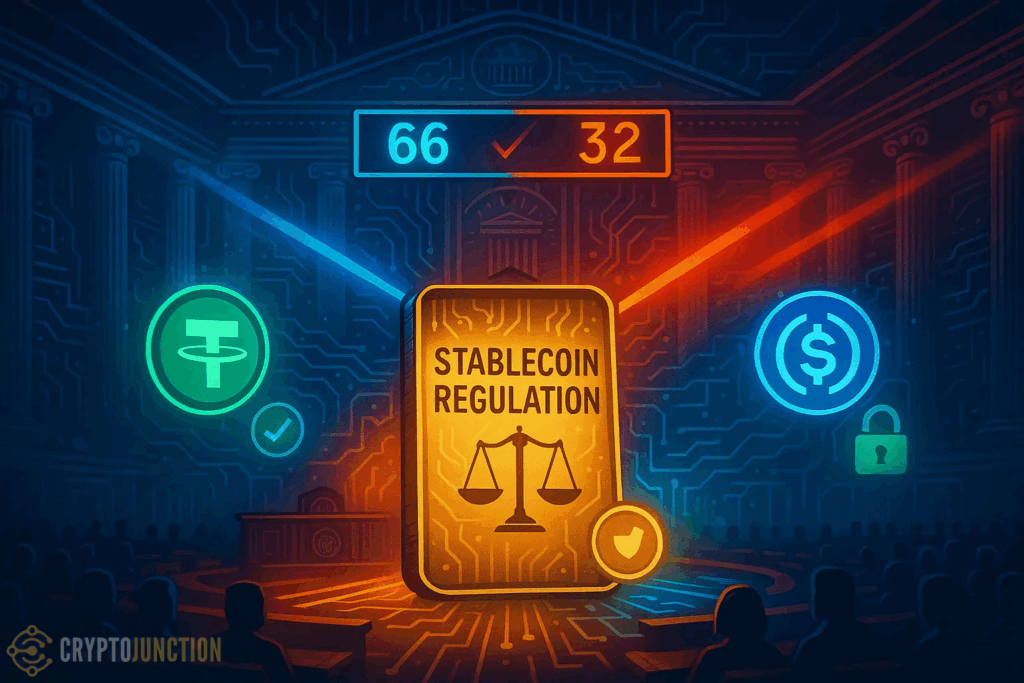In a defining moment for crypto, the U.S. Senate on May 19, 2025, voted 66-32 in favour of the passage of the GENIUS Act. This is to say the Guiding and Establishing National Innovation for U.S. Stablecoin Act. This breaks from a recent stalemate and brings into reality the prospect of federal regulation of stablecoins like never before. The bill aims to bring much-needed clarity to the crypto space. It does this by putting in place a licensing system for issuers and rules which do not allow for interest to be paid to stablecoin holders.
The passage reports a big breakthrough for the crypto industry, which has been operating under a variable state regulatory structure and unclear federal input. Stablecoin regulation is receiving bipartisan support, which contrasts past disputes. Two weeks ago, Democrats voted against the bill but revised it to include consumer protection measures, foreign issuer supervision, and anti-money laundering. This revision brought 16 Democrats to support the bill, alongside most Republicans.
Stablecoin Rules See Support From All Parties Also Criticized
The GENIUS Act has seen growing support from both parties, relevant to the unregulated growth of stablecoins and the emerging need for stablecoin regulation. Senator Kirsten Gillibrand, one of the bill’s key sponsors, reports it to be essential legislation. It aims to keep innovation at home and for the U.S. dollar to remain dominant. Also, in this go-round of the bill, we see included stronger consumer protections. It highlights that stablecoins are not insured like bank deposits.
Still, not all lawmakers bought in. Senate Minority Leader Chuck Schumer and Senator Elizabeth Warren took the lead in opposition. Warren stated that the bill doesn’t do enough to solve the issue at hand and has too many flaws to be ignored. She noted that the law might support growth in the stablecoin market, which does not address issues of financial instability. Furthermore, political corruption concerns arise in regard to President Trump’s association with crypto ventures.
Yet in the case of pragmatists such as Senator Mark Warner, the bill is put forth as a start. Stablecoin regulation requires us to see that “Innovation will take place with or without us. It is our responsibility to see to it that it happens under strong fair oversight.”
Stablecoin Regulation In For Crypto’s Transformation
Stablecoin regulation, as a result of the passage of the GENIUS Act, will be a turning point for the industry. Should it become law, we will see a uniform national structure. This will put an end to regulatory ambiguity and may see growth in institutional adoption. Also, clear rules on issues, disclosures, and consumer protection will increase trust in stablecoins’ performance. This, in turn, will reduce systemic risks.
Supporters also note that the legislation improves global competitiveness. Through regulation at home, the U.S. is able to stop innovation from going overseas. The bill’s structure brings the U.S. financial system into the tech age, setting global standards for stablecoin operation.
The GENIUS Act is to go forward to the Senate floor for debate. We expect a final vote to take place after Congress returns from the Memorial Day break. If it passes, stablecoin regulation will demand reconciliation with the House version before going to President Trump’s desk. As for timing, that is yet to be seen. The bill marks a new era in crypto policy, in which regulation is no longer a choice but a necessity.

